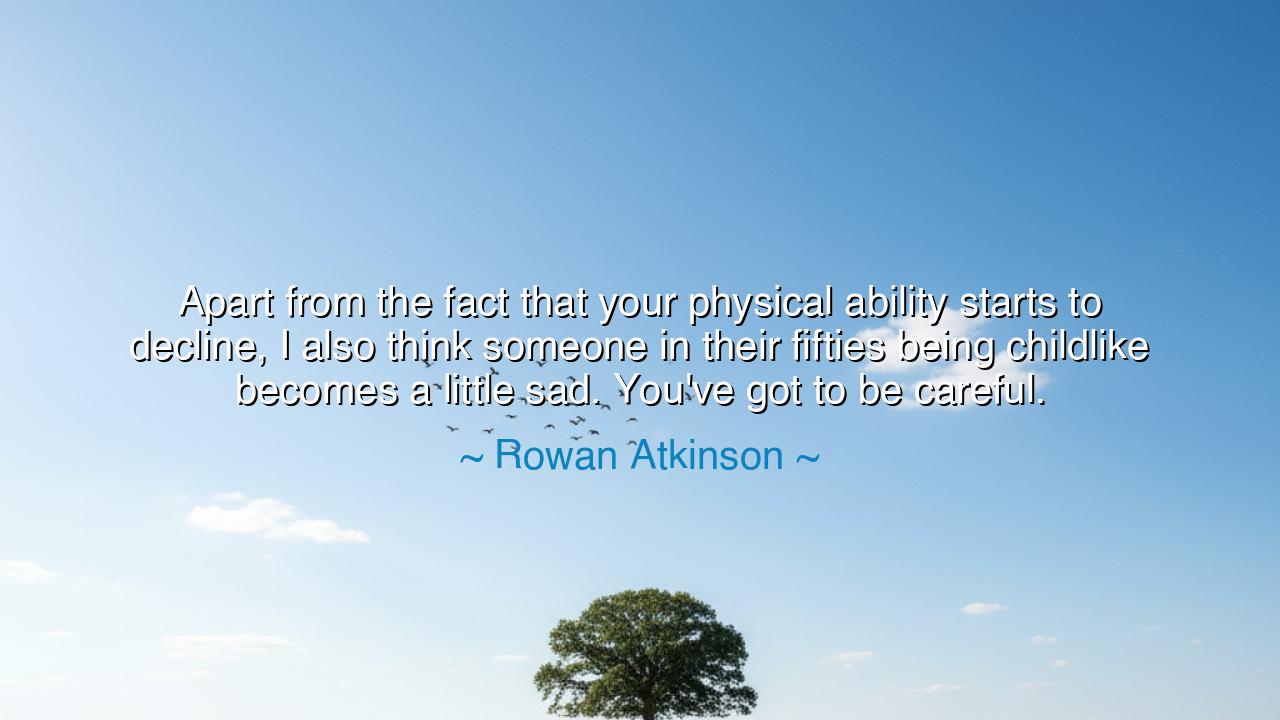
Apart from the fact that your physical ability starts to decline
Apart from the fact that your physical ability starts to decline, I also think someone in their fifties being childlike becomes a little sad. You've got to be careful.






In the twilight of human years, when the fire of youth softens into the steady glow of maturity, Rowan Atkinson spoke words that resonate like the toll of an ancient bell: “Apart from the fact that your physical ability starts to decline, I also think someone in their fifties being childlike becomes a little sad. You've got to be careful.” These words carry not cynicism, but wisdom—the recognition that every age holds its own dignity, its own season of grace. What he speaks of is not the loss of joy, but the transformation of it; not the death of playfulness, but the rebirth of purpose.
In youth, to be childlike is a virtue. It is the mark of curiosity, wonder, and unguarded delight. Yet as the years pass and the body begins to whisper its quiet reminders of time, the same childlikeness, if clung to without discernment, may drift into denial—a refusal to embrace the solemn beauty of maturity. Atkinson’s caution, “You’ve got to be careful,” is a call to balance, a plea for harmony between the soul’s eternal youth and the body’s mortal truth. To ignore the passage of time is to war against nature herself, and the ancients taught that such defiance leads not to freedom, but to folly.
Let us remember King Lear, that mighty monarch of Shakespeare’s imagining, who, though aged and wise in years, chose to act with the impetuous heart of a child. He surrendered his throne in exchange for affection, seeking to play once more at innocence, blind to the cunning of the world. And so, his story became one of sorrow and awakening—a mirror to Atkinson’s warning. When the elder forgets his season, when he refuses the cloak of age’s humility, the gods themselves may teach him what he has lost. Lear’s tragedy was not age itself—it was the refusal to wear age with wisdom.
Yet this truth is not spoken to shame joy or laughter. Nay, for joy is the wine of life, and laughter is its fragrance. What Atkinson calls us to is discernment—to know when childlike wonder becomes childish avoidance. The wise do not mourn their fading vigor; they transmute it. They trade speed for patience, strength for steadiness, and passion for peace. Just as autumn trees release their leaves not in grief but in grace, so must we let go of certain vanities to embrace the serenity of knowing ourselves more deeply.
Think of Leonardo da Vinci, who in his youth raced to invent and to paint with feverish brilliance, but in his later years turned to quiet observation—the study of water, of anatomy, of flight. His hands trembled, his body slowed, yet his mind ascended beyond the limits of youth. He did not cling to childish play; he evolved it into the sacred play of creation. This is what it means to grow older wisely: not to abandon joy, but to deepen it, to turn laughter into insight and motion into meaning.
Atkinson’s words also carry compassion—for he is an artist of laughter, one who has lived through the paradox of comedy: that humor is both youthful and ancient. He understands that the performer who never grows inwardly becomes a shadow of his former brilliance, trapped in the repetition of his own past. Thus, his warning is to all who live in nostalgia, who hide behind the mask of eternal youth. Life is not meant to be an endless summer; it is a cycle of seasons, each with its own harvest. To deny that truth is to live half a life.
So, the lesson is clear: Honor your years. Let youth dwell in your heart, but let wisdom guide your steps. Do not mourn the passing of vitality; channel it into gentleness, into teaching, into the quiet courage of self-knowledge. When your body slows, let your soul quicken. When your face bears time’s script, let your spirit speak poetry through it. Be careful, yes—but careful not to lose your humanity, careful not to chase youth so fiercely that you outrun grace itself.
For in the end, the truest kind of youth is not of body, but of spirit—the kind that knows joy without foolishness, that feels deeply without vanity, that laughs even in stillness. To live thus is to walk the golden path between child and sage, where laughter and wisdom dwell side by side. That is the art of aging well—the art that Atkinson, through his gentle warning, invites us all to learn.






AAdministratorAdministrator
Welcome, honored guests. Please leave a comment, we will respond soon